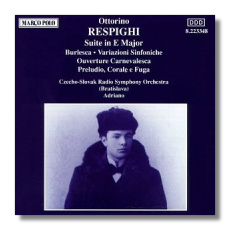
The Internet's Premier Classical Music Source
Related Links
- Respighi Reviews
- Latest Reviews
- More Reviews
-
By Composer
-
Collections
DVD & Blu-ray
Books
Concert Reviews
Articles/Interviews
Software
Audio
Search Amazon
Recommended Links
Site News
 CD Review
CD Review
Ottorino Respighi

Early Orchestral Works
- "Burlesca" (1906)
- Overture Carnevalesca (1913)
- Prélude, Chorale & Fugue (1901)
- Suite in E Major (1903)
- Symphonic Variations (1900)
Slovak State Philharmonic Orchestra, Košice/Adriano
Marco Polo 8.223348 1991 DDD 78:20
Should we hold in suspicion musicians bearing but a single name? Apparently not, based upon this disc of Respighi works conducted by the enigmatic "Adriano", about whom the CD booklet says the following: "Swiss-born protégé of conductor Ernest Ansermet". Judging by the artistic success of this recording, Adriano is a very fine conductor. He offers much on this recording to listeners who appreciate the late Romantic symphonic genre, and he has truly transformed the often mediocre CSR orchestra into a polished and responsive ensemble of the highest calibre.
The music consists of early (and likely unfamiliar) Respighi. The opening piece, "Variazione Sinfoniche" (12:21) consists of a rather unmemorable theme and its several transformations. It is how Respighi treats this theme that makes for an interesting bit of listening - he includes a march, adagio and scherzo. About nine minutes into the work, a powerful organ entrance occurs (it is richly recorded, too). The variations conclude with a vigorous fugue and a triumphant brass send-off. I liked this piece!
Track number two contains "Preludio, Chorale e Fuga" (17:37). It opens in a breezy fashion, soon developing a solemn proclamation in the brass (the chorale) after a cymbal crash. The chorale melody is given over to the violin, which sings a tender solo. The strings with harp provide a sense of calm at this point - in a sequence of quite lovely music. A baroque-ish, agitated fugue is begun, with brass and timpani support prior to its subsiding. At one point there is even a hint of von Reznicek's Donna Diana Overture. Then the horns, trumpets and trombones in turn announce the sectioned chorale once more, as the music swells as if riding the crest of an ocean storm. A full treatment of the seven note chorale follows, replete with a feeling of religious majesty and grandeur. An idyllic diminuendo, on strings and piped trumpets, starts peacefully, but gains power with zarathustrian trumpets and timpani.
Two brief orchestral pieces follow, "Burlesca", with its Sibelean (Fourth Symphony) and Villa-Lôbos (ostinato rhythm) soud-alikes, plus the "Ouverture Carnevalesca". The former contains familiar Respighi signposts, including the charming use of the celesta, the use of rich, swirling string tone, and chatty woodwinds. It is a tight, evocative work which holds one's attention. The "Ouverture" begins passionately in unison strings, and the slavic style Respighi adopts here brings to mind such composers as Mussorgsky and Tchaikovsky (his Manfred Symphony, especially). Cellos and snare drum are featured before the entire symphony orchestra takes part in the spirited, dazzling conclusion to a less cohesive, but always interesting, piece of music.
The major work on this disc is the so-called "Suite in E Major", which is more a symphony, owing to its four movements and standard chord progressions. Throughout this piece, Respighi again indicates a debt to other Romantic masters, and one can hear echoes of Rimsky-Korsakov, Tchaikovsky, and even Dvořák. As a tone poem, the "Suite" likely even surpasses Rimsky's efforts in the genre. It opens beautifully, with a curious adagio/allegro and a very Russian allegretto vivace. The finale, marked allegro energico, ends in optimistic fashion. At one point you will hear a snare drum-punctuated trumpet call right out of Tchaikovsky's Swan Lake (it took me days to finally figure this out - I'll spare you the same chore - it was driving me nuts!) before the work finishes.
As I generally enjoy music of this style, I can easily recommend this recording. It boasts exquisite sound, top-notch performances, unusual music probably never before recorded, and one of the longest CD playing times I personally know of. Though it may be difficult to track down in some shops, it is well worth searching out. According to the information in the booklet, conductor Adriano is a Respighi scholar and authority, and plans in the years ahead to record more of that composer's little-known gems for Marco Polo. To Adriano, his orchestra, and Marco Polo, we must say, "thanks!".
Copyright © 1996, Peter S. Murano


















